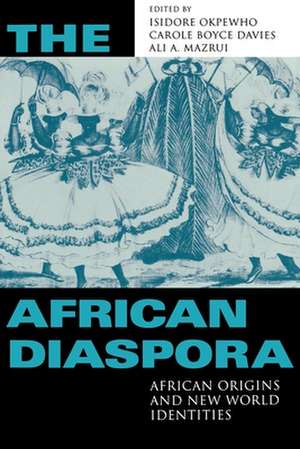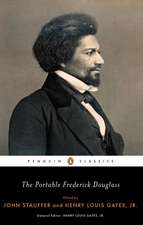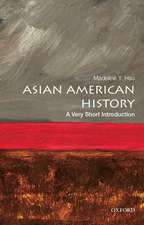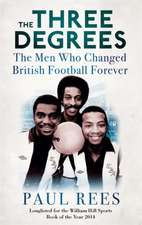The African Diaspora – African Origins and New World Identities
Autor Isidore Okpewho, Carole Boyce Davies, Ali A. Mazruien Limba Engleză Paperback – 8 noi 2001
Preț: 293.11 lei
Nou
Puncte Express: 440
Preț estimativ în valută:
56.10€ • 60.96$ • 47.16£
56.10€ • 60.96$ • 47.16£
Carte tipărită la comandă
Livrare economică 21 aprilie-05 mai
Preluare comenzi: 021 569.72.76
Specificații
ISBN-13: 9780253214942
ISBN-10: 0253214947
Pagini: 600
Ilustrații: 33 b&w photographs
Dimensiuni: 188 x 233 x 33 mm
Greutate: 0.82 kg
Editura: MH – Indiana University Press
Locul publicării:United States
ISBN-10: 0253214947
Pagini: 600
Ilustrații: 33 b&w photographs
Dimensiuni: 188 x 233 x 33 mm
Greutate: 0.82 kg
Editura: MH – Indiana University Press
Locul publicării:United States
Cuprins
Acknowledgments
Introduction, Isidore Okpewho
Part 1. The Diaspora: Orientations and Determinations
1. Michael J. C. Echeruo, An African Diaspora: The Ontological Project
2. Maureen Warner-Lewis, Cultural Reconfigurations in the African Caribbean
3. Elliott P. Skinner, The Restoration of African Identity for a New Millenium
Part 2. Addressing the Constraints
4. Joseph E. Inikori, Slaves or Serfs?: A Comparative Study of Slavery and Serfdom in Europe and Africa
5. Richard Price, Modernity, Memory, Martinique
6. Peter P. Ekeh, Kinship and State in African and African American Histories
7. Jack S. Blocker, Jr., Wages of Migration: Jobs and Homeownership Among Black and White Workers in Muncie, Indiana, 1920
8. Ira Kincaid Blake, The Significance of Cognitive-Linguistic Orientation for Academic Well- Being in African American Children
9. Sharon Aneta Bryant, The Relationship of Place of Birth and Health Status
Part 3. Race, Gender, and Image
10. Celia M. Azevedo, Images of Africa and the Haiti Revolution in American and Brazilian Abolitionism
11. Kimberly Welch, Our Hunger is Our Song: The Politics of Race in Cuba, 1900-1920
12. Antonio Benítez-Rojo, The Role of Music in the Emergence of Afro-Cuban Culture
13. Sally Price, The Centrality of Margins: Art, Gender, and African American Creativity
14. Eliana Guerreiro Ramos Bennett, Gabriela Cravo e Canela: Jorge Amado and the Myth of the Sexual Mulatta in Brazilian Culture
15. Patience Elabor-Idemudia, Gender and the New African Diaspora: African Immigrant Women in the Canadian Labor Force
16. Sandra L. Richards, Horned Ancestral Masks, Shakespearean Actor Boys, and Scotch-Inspired Set Girls: Social Relations in Nineteenth-Century Jamaican Jonkonnu
Part 4. Creativity, Spirituality, and Identity
17. Oyekan Owomoyela, From Folklore to Literature: The Route from Roots in the African World
18. Jean Rahier, Blackness as a Process of Creolization: The Afro-Esmeraldian Décimas (Ecuador)
19. Niyi Afolabi, The (T)error of Invisibility: Ellison and Cruz e Souza
20. Adetayo Alabi, Recover, Not Discover: Africa in Walcott's Dream on Monkey Mountain and Philip's Looking for Livingstone
21. Ali A. Mazrui, Islam and the African Diaspora: The Impact of Islamigration
22. Pierre-Damien Mvuyekure, From Legba to Papa Labas: New World Metaphysical Self/Refashioning in Ishmael Reed's Mumbo Jumbo
23. Robert Elliott Fox, Diasporacentricism and Black Aural Texts
24. David Evans, The Reinterpretation of African Musical Instruments in the United States
25. Nkiru Nzegwu, The Concept of Modernity in Contemporary African Art
26. LeGrace Benson, Habits of Attention: Persistence of Lan Ginée in Haiti
27. Andrea Frohne, Representing Jean-Michel Basquiat
28. Charles Martin, Optic Black: Implied Texts and the Colors of Photography
29. Keith Q. Warner, Caribbean Cinema, or Cinema in the Caribbean?
Part 5. Reconnecting with Africa
30. Laura J. Pires-Hester, The Emergence of Bilateral Diaspora Ethnicity among Cape Verdean-Americans
31. Alvin B. Tillery, Jr., Black Americans and the Creation of America's Africa Policies: The De-Racialization of Pan-African Politics
32. Joseph McLaren, Alice Walker and the Legacy of African American Discourse on Africa
33. Joyce Ann Joyce, African-Centered Womanism: Connecting Africa to the Diaspora
Contributors
Index
Introduction, Isidore Okpewho
Part 1. The Diaspora: Orientations and Determinations
1. Michael J. C. Echeruo, An African Diaspora: The Ontological Project
2. Maureen Warner-Lewis, Cultural Reconfigurations in the African Caribbean
3. Elliott P. Skinner, The Restoration of African Identity for a New Millenium
Part 2. Addressing the Constraints
4. Joseph E. Inikori, Slaves or Serfs?: A Comparative Study of Slavery and Serfdom in Europe and Africa
5. Richard Price, Modernity, Memory, Martinique
6. Peter P. Ekeh, Kinship and State in African and African American Histories
7. Jack S. Blocker, Jr., Wages of Migration: Jobs and Homeownership Among Black and White Workers in Muncie, Indiana, 1920
8. Ira Kincaid Blake, The Significance of Cognitive-Linguistic Orientation for Academic Well- Being in African American Children
9. Sharon Aneta Bryant, The Relationship of Place of Birth and Health Status
Part 3. Race, Gender, and Image
10. Celia M. Azevedo, Images of Africa and the Haiti Revolution in American and Brazilian Abolitionism
11. Kimberly Welch, Our Hunger is Our Song: The Politics of Race in Cuba, 1900-1920
12. Antonio Benítez-Rojo, The Role of Music in the Emergence of Afro-Cuban Culture
13. Sally Price, The Centrality of Margins: Art, Gender, and African American Creativity
14. Eliana Guerreiro Ramos Bennett, Gabriela Cravo e Canela: Jorge Amado and the Myth of the Sexual Mulatta in Brazilian Culture
15. Patience Elabor-Idemudia, Gender and the New African Diaspora: African Immigrant Women in the Canadian Labor Force
16. Sandra L. Richards, Horned Ancestral Masks, Shakespearean Actor Boys, and Scotch-Inspired Set Girls: Social Relations in Nineteenth-Century Jamaican Jonkonnu
Part 4. Creativity, Spirituality, and Identity
17. Oyekan Owomoyela, From Folklore to Literature: The Route from Roots in the African World
18. Jean Rahier, Blackness as a Process of Creolization: The Afro-Esmeraldian Décimas (Ecuador)
19. Niyi Afolabi, The (T)error of Invisibility: Ellison and Cruz e Souza
20. Adetayo Alabi, Recover, Not Discover: Africa in Walcott's Dream on Monkey Mountain and Philip's Looking for Livingstone
21. Ali A. Mazrui, Islam and the African Diaspora: The Impact of Islamigration
22. Pierre-Damien Mvuyekure, From Legba to Papa Labas: New World Metaphysical Self/Refashioning in Ishmael Reed's Mumbo Jumbo
23. Robert Elliott Fox, Diasporacentricism and Black Aural Texts
24. David Evans, The Reinterpretation of African Musical Instruments in the United States
25. Nkiru Nzegwu, The Concept of Modernity in Contemporary African Art
26. LeGrace Benson, Habits of Attention: Persistence of Lan Ginée in Haiti
27. Andrea Frohne, Representing Jean-Michel Basquiat
28. Charles Martin, Optic Black: Implied Texts and the Colors of Photography
29. Keith Q. Warner, Caribbean Cinema, or Cinema in the Caribbean?
Part 5. Reconnecting with Africa
30. Laura J. Pires-Hester, The Emergence of Bilateral Diaspora Ethnicity among Cape Verdean-Americans
31. Alvin B. Tillery, Jr., Black Americans and the Creation of America's Africa Policies: The De-Racialization of Pan-African Politics
32. Joseph McLaren, Alice Walker and the Legacy of African American Discourse on Africa
33. Joyce Ann Joyce, African-Centered Womanism: Connecting Africa to the Diaspora
Contributors
Index
Recenzii
The editorial goal of this collection, gathered from papers of a 1996 conference, is to deepen understanding of how transplanted African populations (and their descendants) interacted with the physical, cultural, and intellectual environment of the New World. This goal mandates an assessment of the survival of African origins--an ongoing debate between the Essentialist school (a strong and continuous African presence) and those advocating a more syncretic viewpoint (an African presence more mutable and interactive with the new environment). The papers present both views and draw their evidence from a variety of disciplines: art, music, literature, linguistics, history, and sociology. The thematic grouping of the papers (e.g., Race, Gender, and Image), coupled with an introduction that succeeds in the difficult task of connecting most of the presentations, makes intelligible the variety of approaches and views. Undergraduate instructors in African American history and sociology can assign selected papers to illustrate methodology and stimulate discussion. History students, for example, will profit from Joseph E. Inikori's comments on the dangers inherent in applying the word slavery to the subject peoples of Africa. Upper-division undergraduates and above.--R. T. Ingoglia, Felician College"Choice" (01/01/2000)
Descriere
How black identities were forged in New World cultures












